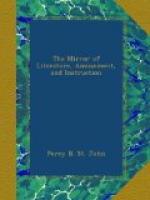in the recurrence of noble traits, which are too pleasing
ever to be viewed with indifference; like the regular
features which we sometimes find in the face of a lovely
woman, their charm consists in their own intrinsic
gracefulness, rather than in the variety of their
expressions. The Ohio has not the sprightly,
fanciful wildness of the Niagara, the St. Lawrence,
or the Susquehanna, whose impetuous torrents, rushing
over beds of rocks, or dashing against the jutting
cliffs, arrest the ear by their murmurs, and delight
the eye with their eccentric wanderings. Neither
is it like the Hudson, margined at one spot by the
meadow and the village, and overhung at another by
threatening precipices and stupendous mountains.
It has a wild, solemn, silent sweetness, peculiar
to itself. The noble stream, clear, smooth, and
unruffled, swept onward with regular majestic force.
Continually changing its course, as it rolls from
vale to vale, it always winds with dignity, and avoiding
those acute angles, which are observable in less powerful
streams, sweeps round in graceful bends, as if disdaining
the opposition to which nature forces it to submit.
On each side rise the romantic hills, piled on each
other to a tremendous height; and between them are
deep, abrupt, silent glens, which at a distance seem
inaccessible to the human foot; while the whole is
covered with timber of a gigantic size, and a luxuriant
foliage of the deepest hues. Throughout this
scene there is a pleasing solitariness, that speaks
peace to the mind, and invites the fancy to soar abroad,
among the tranquil haunts of meditation. Sometimes
the splashing of the oar is heard, and the boatman’s
song awakens the surrounding echoes; but the most
usual music is that of the native songsters, whose
melody steals pleasingly on the ear, with every modulation,
at all hours, and in every change of situation.—
Hon.
Judge Hall’s Letters from the West.
* * * *
*
SNOW-WOMAN’S STORY.
By Miss Edgeworth.
“Yes, madam, I bees an Englishwoman, though
so low now and untidy like—it’s a
shame to think of it—a Manchester woman,
ma’am—and my people was once in a
bettermost sort of way—but sore pinched
latterly.” She sighed, and paused.
“I married an Irishman, madam,” continued
she, and sighed again.
“I hope he gave you no reason to sigh,”
said Gerald’s father.
“Ah, no, sir, never!” answered the Englishwoman,
with a faint sweet smile. “Brian Dermody
is a good man, and was always a koind husband to me,
as far and as long as ever he could, I will say that—but
my friends misliked him—no help for it.
He is a soldier, sir,—of the forty-fifth.
So I followed my husband’s fortins, as nat’ral,
through the world, till he was ordered to Ireland.
Then he brought the children over, and settled us
down there at Bogafin in a little shop with his mother—a
widow. She was very koind too. But no need
to tire you with telling all. She married again,
ma’am, a man young enough to be her son—a
nice man he was to look at too—a gentleman’s
servant he had been. Then they set up in a public-house.
Then the whiskey, ma’am, that they bees all
so fond of—he took to drinking it in the
morning even, ma’am—and that was
bad, to my thinking.”




